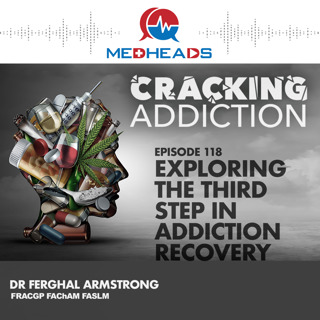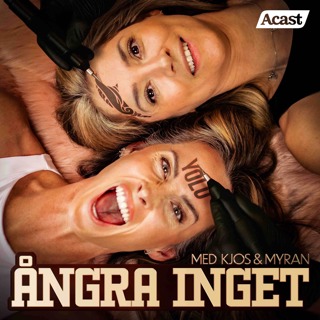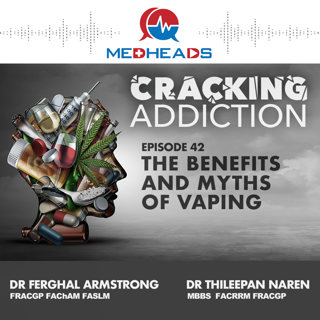
The Benefits and Myths of Vaping
In this 1st of three episodes of Cracking Addiction we are joined by Dr Colin Mendelsohn to discuss the harms of tobacco usage, what vaping is and how vaping can be useful to aid smoking cessation, the myths and benefits surrounding nicotine and the efficacy of vaping in smoking cessation. Nicotine vaping is surrounded in mystery with a lot of myths and misinformation abounding and in this episode we try and dispel some of this misinformation.Discussions and comments in our videos are for informational purposes only and should not replace the advice of your medical professional. Please consult with your doctor before making any changes to your medical treatment or lifestyle.Latest Blogshttps://www.meducate.com.au/blogAbout Meducate ®Meducate provides online education for doctors, clinicians, health professionals and the public.See the website to browse the many different talks and courses available https://www.meducate.com.au
1 Juni 202217min
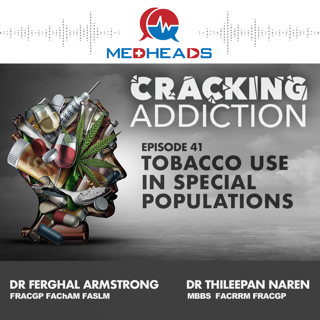
Tobacco use in special populations
In this episode of Cracking Addiction we discuss tobacco use in pregnancy and the those with mental health disorders and the evidence around smoking cessation in these special population groups.Discussions and comments in our videos are for informational purposes only and should not replace the advice of your medical professional. Please consult with your doctor before making any changes to your medical treatment or lifestyle.Latest Blogshttps://www.meducate.com.au/blogAbout Meducate ®Meducate provides online education for doctors, clinicians, health professionals and the public.See the website to browse the many different talks and courses available https://www.meducate.com.au
25 Maj 202223min
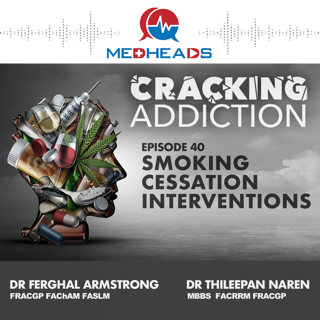
Smoking cessation interventions
In this episode of Cracking Addiction we discuss various smoking cessation interventions including behavioural interventions, nicotine replacement therapy, varenicline, bupropion and nortriptyline to aid patients in stopping smoking.Discussions and comments in our videos are for informational purposes only and should not replace the advice of your medical professional. Please consult with your doctor before making any changes to your medical treatment or lifestyle.Latest Blogshttps://www.meducate.com.au/blogAbout Meducate ®Meducate provides online education for doctors, clinicians, health professionals and the public.See the website to browse the many different talks and courses available https://www.meducate.com.au
19 Maj 202218min

Tobacco use disorder
In this episode of Cracking Addiction we discuss the harms associated with tobacco use, the health benefits of tobacco cessation, briefly discuss smoking cessation interventions and highlight the importance of brief interventions in eliciting behaviour change.Discussions and comments in our videos are for informational purposes only and should not replace the advice of your medical professional. Please consult with your doctor before making any changes to your medical treatment or lifestyle.Latest Blogshttps://www.meducate.com.au/blogAbout Meducate ®Meducate provides online education for doctors, clinicians, health professionals and the public.See the website to browse the many different talks and courses available https://www.meducate.com.au
12 Maj 202218min
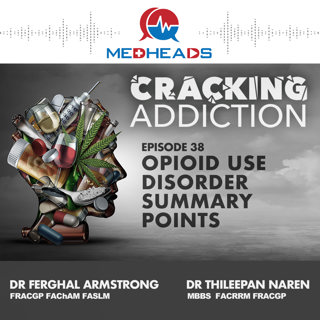
Opioid Use Disorder summary points
In Episode 38 of Cracking Addiction we summarise the previous episodes regarding opioid use disorder and discuss a framework on the safe management of patients with opioid use disorder.Discussions and comments in our videos are for informational purposes only and should not replace the advice of your medical professional. Please consult with your doctor before making any changes to your medical treatment or lifestyle.Latest Blogshttps://www.meducate.com.au/blogAbout Meducate ®Meducate provides online education for doctors, clinicians, health professionals and the public.See the website to browse the many different talks and courses available https://www.meducate.com.au
4 Maj 202232min

Social comorbidity in substance use disorder
In episode 37 of Cracking Addiction we discuss in detail some of the social comorbidities associated with substance use disorders and what to screen for, be aware of and some management strategies to tackle these social comorbidities.Social isolation and alienation are some of the unfortunate hallmarks of substance use disorder. Some of the biggest social harms that occur to the patient are the harms that can occur with increased rates of unemployment, homelessness, broken relationships and social isolation. Loneliness appears to be a significant product and by-product of substance use disorder and can lead to worsening outcomes.Some of the social harms to society include the role of acquisitive crime to fund drug usage in some circumstances, increased rates of violence and domestic violence in particular as well as potential risks of child endangerment and child welfare concerns. It is important that we focus on safety with the above concerns, and that in the case of domestic violence and child abuse that medical practitioners are aware of their mandatory reporting requirements and also how to support women and children in particular who are at risk of violence or other harms and which supports and services one can refer them to. The role of incarceration in the management of substance use disorder is controversial. History has provided numerous examples of where prohibition of drugs was ineffective and incarceration for substance use disorder (which is a medical condition) does not appear to be effective in reducing drug usage or it’s associated harms. Effective treatment of substance use disorder and consideration of decriminalisation of drugs and managing patients through diversion and rehabilitation programs would likely be of more benefit for the individual and society as a whole. Furthermore, by marginalising people with substance use disorder and treating people like criminals and incarcerating people we risk alienating and further stigmatising people. From a governmental perspective this could include less people participating in the workforce and a loss of tax revenue, the costs of incarcerating people and the costs of the criminal justice system to process people through this system.In summary there are significant social comorbidities associated with substance use disorder. Treating people with substance use disorders holistically, understanding the potential struggles which they might encounter and providing appropriate assistance might help decrease the social harms associated with substance use disorder for both the individual but society as a whole.Discussions and comments in our videos are for informational purposes only and should not replace the advice of your medical professional. Please consult with your doctor before making any changes to your medical treatment or lifestyle.Latest Blogshttps://www.meducate.com.au/blogAbout Meducate ®Meducate provides online education for doctors, clinicians, health professionals and the public.See the website to browse the many different talks and courses available https://www.meducate.com.au
27 Apr 202227min
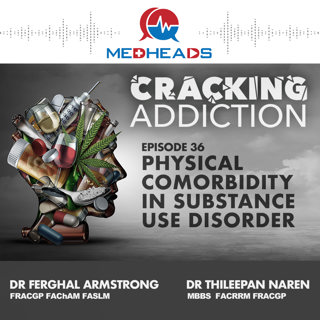
Physical comorbidity in substance use disorder
In episode 36 of Cracking Addiction we discuss in detail some of the physical comorbidities associated with substance use disorders and what to screen for, be aware of and some management techniques.People with substance use disorders often deal with many medical and physical issues that can impact both their quality of life but also increase the risks of morbidity and mortality. There are a number of medical and physical conditions that could be discussed but for the sake brevity this blog post will detail the following:• Chronic pain• Tobacco use• Infectious diseases• Chronic NSAID toxicityChronic painChronic pain alters brain’s stress and reward systems and increases the risk for developing an opioid use disorder. It is thought that up to 30% of chronic pain patients misuse prescription opioids and this is becoming an increasingly problematic matter within society. Recent data and statistics reveal that prescription drug deaths in Victoria now exceed the road toll. The treatment and management of chronic non-cancer related pain is now moving away from a medication centred approach and indeed chronic opioid medication usage are associated with long-term harms within this group including increased risks of opioid induced hyperalgaesia, osteoporosis and hypothalamic pituitary gonadal axis dysfunction. The management of chronic non-cancer related pain now increasingly centres around active pain management strategies, physical therapy, allied health input and rehabilitation activities.Tobacco useMany patients with substance use disorders smoke tobacco and broaching smoking and tobacco cessation is important to improving the overall health and wellbeing of the patient. Oftentimes it appears other drugs and substances take priority of tobacco usage but tobacco usage is also associated with significant harms to the patient. It is important to discuss the harms of smoking with patients with substance use disorders and offer smoking cessation interventions. Tobacco usage is responsible for the majority of lung cancer and approximately one-third of all cancer related deaths. Tobacco use is also directly responsible for: cardiovascular disease, reduced immunity, poor wound healing, age related macular degeneration and worsening chronic pain.Infectious diseasesPatients with substance use disorder are at increased risk of some infectious diseases and it is important to screen people appropriately. In particular people who inject drugs and share needles or who engage in commercial sex work to pay for drugs require screening for blood borne viruses and the latter group in particular will require a thorough sexually transmitted infection screen. Blood borne virus screening includes screening for Hepatitis B, C and HIV and STI screening includes screening for chlamydia, gonorrhoea and syphilis in the first instance.People who inject drugs are also at risk of skin infections and abscesses as a result of injecting drug use and skin examination should be carried out periodically to exclude thrombophlebitis in veins, cellulitis and one should always consider the risks of infective endocarditis in the appropriate clinical scenario. It is important to be thorough and systematic in our physical examination of our patients and when ordering tests so as not to miss an important medical diagnosis.Chronic NSAID toxicityCodeine misuse and dependency associated with chronic non-steroidal anti-inflammatory drug (NSAID) toxicity. NSAIDS can ulceration of the gastrointestinal tract which can lead to bleeding and even perforation of the gastrointestinal tract in severe circumstances. Chronic NSAIDs usage can lead to iron deficiency with or without anaemia due to bleeding from the gastrointestinal tract. Chronic NSAID usage can also lead to recurrent metabolic acidosis and also cause significant renal impairment and lead to NSAID nephropathy...
20 Apr 202224min
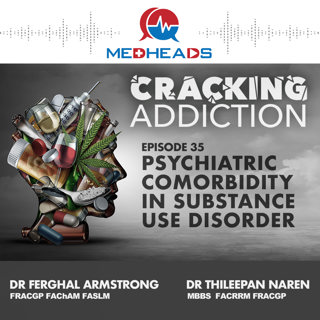
Psychiatric comorbidity in substance use disorder
In episode 35 of Cracking Addiction we discuss in detail some of the psychiatric comorbidities associated with substance use disorders and what to screen for, be aware of and some management techniques.Discussions and comments in our videos are for informational purposes only and should not replace the advice of your medical professional. Please consult with your doctor before making any changes to your medical treatment or lifestyle.Latest Blogshttps://www.meducate.com.au/blogAbout Meducate ®Meducate provides online education for doctors, clinicians, health professionals and the public.See the website to browse the many different talks and courses available https://www.meducate.com.au
13 Apr 202223min
